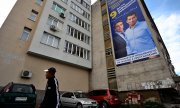What will the parliamentary elections in Bulgaria bring?
Bulgaria will elect a new parliament for the fourth time in two years this Sunday, after the pro-European coalition under Kiril Petkov collapsed in June. According to polls, Boyko Borisov's Gerb will emerge as the strongest party while the pro-Russian, ultra-nationalist Vazrazhdane party looks set to secure 12 percent, more than doubling its share of the vote. Stable majorities are not to be expected, commentators note.
A time-limited coalition
The governing coalition that emerges from these elections will at least last a year, says Dnevnik:
“Nobody wants new elections in spring, not even the politicians, no matter what they all say. Even those who lose on Sunday have no interest in that. This creates good conditions for forming a government now that will last at least until next summer. Moreover, local elections will be held in autumn 2023, a perfect excuse to form some kind of government now and hold the next elections at the same time as the local ones.”
Winning votes with the help of Russian propaganda
The Bulgarian service of Deutsche Welle explains the reasons for expected major gains for the pro-Russian, ultra-nationalist party Vazrazhdane (Revival):
“Vazrazhdane gets the votes of people who believe the Russian propaganda in Bulgaria that portrays Putin as a victim of the West, which doesn't respect Russia's demands. Why we should respect the demands of a dictator remains unclear, apart from the fact that he has nuclear weapons and is crazy enough to use them. Fear is the driving force here. It is prompting people to try to escape the aggressor's fury: instead of standing up to this fury they want to appease him by voting for Vazrazhdane.”

